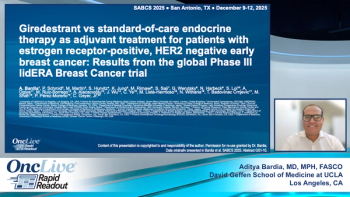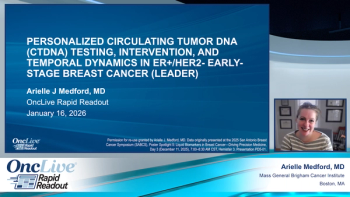
A Phase 1 Clinical Trial Evaluating Monotherapy With Exarafenib (KIN-2787), a Highly Selective Pan-RAF Inhibitor, in BRAF‑Altered Solid Tumors and NRAS-Mutant Melanoma
Alexander I. Spira, MD, PhD, shares new dose escalation data from the first-in-human Phase 1 KIN-2787 study of the pan-RAF inhibitor exarafenib in patients with BRAF-altered solid tumors or NRAS-mutant melanoma.
Background: Patients with cancers driven by BRAF Class II (C II) or C III alterations and/or NRAS mutations are unlikely to benefit from approved BRAF-targeted therapies and have few other treatment options. Exarafenib is a potentially best in class orally available pan-RAF inhibitor optimized for potency & high selectivity. It has differentiated dose-dependent activity across a broad range of cell lines & models driven by BRAF C I (inc. those with acquired resistance to 1st gen RAFi), C II, C III or NRAS alterations.
Methods: KN-8701 (NCT04913285) is an ongoing Phase 1 dose escalation & dose expansion study at 35 sites in 7 countries evaluating exarafenib monotherapy in participants (pts) with advanced solid tumors harboring oncogenic BRAF or NRAS alterations.
Results: Preliminary results as of 13 Dec 2022 are reported for 52 pts (median age 63, 51.9% male) with a median of 3 prior therapies treated in 6 dose levels. Treated pts included those with solid tumors driven by BRAF C I (38.5%), C II (19.2%), C III (28.8%) alterations or melanoma pts with NRAS mutations (13.5%). Steady state exarafenib exposure (Cmax and AUC) increased dose proportionally. Pathway inhibition & decreases in ctDNA were observed across BRAF classes & tumor types. Dose limiting toxicities observed at the highest dose level were Grade 3 (Gr3) acneiform rash & Gr3 macular rash. The maximum tolerated dose (MTD) was determined to be 300 mg bid. Treatment-related adverse events (TRAEs) (any grade) occurred in 69.2% of pts with 13.5% of pts having Gr ≥3 events. Skin AEs (any grade) were the most common TRAEs observed in 48.1% of pts with 7.7% of pts having Gr ≥ 3 skin events. GI TRAEs occurred in 19.2% pts (Gr 1-2 only), including diarrhea (1 pt, Gr 1). Reversible, asymptomatic Gr 3 increased ALT and/or increased AST AEs in 3 pts were the only non-skin Gr ≥ 3 TRAEs reported in ≥ 2 pts. At therapeutically relevant exposures, there was no cutaneous evidence of paradoxical activation. Of the 34 pts across all dose levels with at least 1 post-baseline tumor assessment, 6 pts (17.6%) had a partial response (5 confirmed at submission date) & 16 pts (47.1%) had stable disease including 8 pts (23.5%) with objective tumor shrinkage (up to 20%). The 6 responders all continue exarafenib therapy (treatment duration up to 12 months) and include 3 pts with BRAF C I alteration-driven cancers (inc. 1 RAFi + MEKi pre-treated melanoma pt) and 1 pt each with BRAF C II, BRAF C III-driven & NRAS-mutation driven cancers. For pts who achieved or confirmed their best response at MTD, the response rate was 33% (4/12) & included responses in pts with BRAF C I, C II, C III, and NRAS mutant tumors.
Conclusions: Exarafenib achieves therapeutically meaningful drug exposures and demonstrates promising tolerability & clinical activity in BRAF or NRAS alteration-driven solid tumors. Pt enrollment & exarafenib treatment at 300 mg bid continues.




































